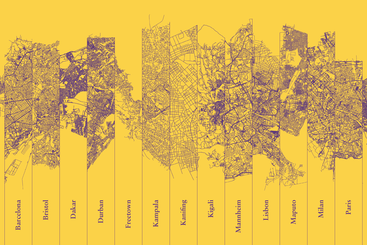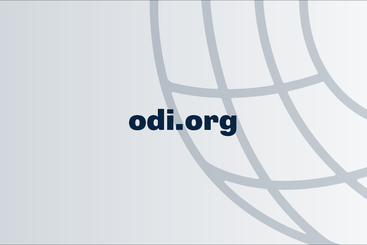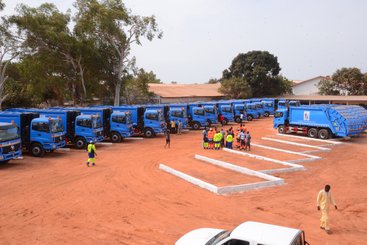Frequently asked questions
What is the Africa-Europe Mayors' Dialogue?
What is the Africa-Europe Mayors' Dialogue?
The Africa-Europe Mayors' Dialogue is a platform of African and European mayors working together to deliver innovative and practical solutions for human mobility in and between their cities.
The Mayors’ Dialogue aspires to a new and equal model of cooperation between Africa and Europe, focusing on the needs of all urban residents and their contribution to economies and societies.
Initiated in 2020, the Dialogue is a city led initiative aiming to create opportunities and improve the lives of all urban residents, including migrants, helping to redress the power imbalances that persist between the two continents.
Frequently asked questions
Which cities are participating?
Which cities are participating?
Participating cities currently include Milan, Freetown, Accra, Agadez, Amsterdam, Barcelona, Bologna, Bristol, Dakar, Durban, Entebbe, Grenoble, Helsinki, Kampala, Kanifing, Kigali, Lisbon, Mannheim, Maputo, Montpellier, Monrovia, Paris, Tunis and Zürich.
Other cities across Africa and Europe are joining throughout 2021 and 2022.
Frequently asked questions
Why is the Mayors' Dialogue needed now?
Why is the Mayors' Dialogue needed now?
Cities matter: by 2050, two-thirds of the world’s population will live in cities. While not all cities grow at the same pace across Africa and Europe, they share similar opportunities and challenges relating to modern urban living, which city leaders are uniquely placed to address.
The last few years have shown that we need new ways of forging global cooperation to find common solutions to shared challenges. Cities are uniquely positioned to reinvigorate the Africa–Europe partnership.
City leaders are quickly informed about and responsive to their residents’ needs. Mayors can thus share insights with other levels of government (national and trans-regional) on how to bridge gaps between diverse communities and societies, with a focus on good practices and innovative approaches.
Frequently asked questions
What does the Mayors' Dialogue aim to achieve?
What does the Mayors' Dialogue aim to achieve?
The Dialogue aspires to a new and more equal model of cooperation between Africa and Europe, focusing on the needs of all urban residents, including migrants, and their contribution to our economies and societies.
The Mayors’ Dialogue aims to create opportunities and improve the lives of all urban residents, helping to redress the power imbalances that persist between the two continents. The Dialogue offers practical approaches for cities and their residents to seize the opportunities of human mobility, develop new skills, fill labor market gaps and thus contribute to inclusive and sustainable urban development.
By 2030, our goal is for cities to have made a significant impact on the implementation of all the global Sustainable Development Goals (SDGs). To make progress on global goals, decision makers at all levels must listen to, work with and support cities. Pragmatic alliances between cities in Africa and Europe can advance global cooperation and inform national and regional policies, on migration and beyond.
How does the Mayors' Dialogue work in practice?
How does the Mayors' Dialogue work in practice?
Mayors across Africa and Europe are working together in a partnership of equals to develop, test and scale innovative solutions for sustainable urban futures.
They are creating concrete city-led initiatives and meaningful partnerships: for example, the cities of Freetown and Milan are partnering to develop skills and investment opportunities in their fashion and textiles industries; the cities of Dakar and Barcelona are working with Senegalese diasporas on job creation schemes targeting young migrants and fishermen who facilitate out-migration from Dakar. Other cities are exploring innovative financing to support better delivery of services to all residents.
Grounded in the practical needs of their residents, these mayors offer fresh perspectives and approaches that can inspire policy and practice within and across countries and regions.
Frequently asked questions
Why human mobility?
Why human mobility?
The Mayors' Dialogue uses the term human mobility to describe all forms of temporary and permanent movements that people experience in and between cities, including: migration to cities from within countries; regional mobility within the two continents; as well as movements between Africa and Europe. Human mobility includes voluntary migration as well as forced displacement, via legal pathways or through irregular channels. It also incorporates all types of mobile populations.
By opting for a comprehensive definition of human mobility, the Dialogue intentionally takes a step back from oversimplified dichotomies that characterise migration and displacement debates, instead focusing on how African and European city leaders can address the opportunities and challenges they have in common.
What does joining the Mayors' Dialogue entail for cities?
What does joining the Mayors' Dialogue entail for cities?
Participating cities will have dedicated support from the core group of partners; to develop partnerships, access funding to support long-term collaboration, to amplify cities’ voices.
Cities will also have access to analysis, knowledge and research, through exchanges and an online learning and exchange platform.
The mayors' commitment to the Dialogue is key: they will meet in Milan in early 2022 to agree how in practice cities can support a more equal partnership between Africa and Europe and they will commit concrete actions and proposals to all residents.
Frequently asked questions
Who are the partner organisations and funders?
Who are the partner organisations and funders?
The Mayors' Dialogue is led by the cities of Freetown and Milan and supported by a core group of partners; ODI, the Mayors Migration Council (MMC), Robert Bosch Stiftung (RBS), the Open Society Foundations (OSF) and the IKEA Foundation.
- ODI acts as the operational and strategic hub for the Mayors’ Dialogue, leading on political and policy engagement, partnership development, research and coordination.
- The MMC provides expert advice and strategic direction in the design and development of the Dialogue.
- The Dialogue is financially supported by Robert Bosch Stiftung, the Open Society Foundations (OSF) and the IKEA Foundation. They provide strategic direction to the Dialogue and help establish connections with key stakeholders in the space, as well as potential new funders.
- The Dialogue advises, influences and collaborates with key city networks, regional bodies, intergovernmental and nongovernmental organisations.


